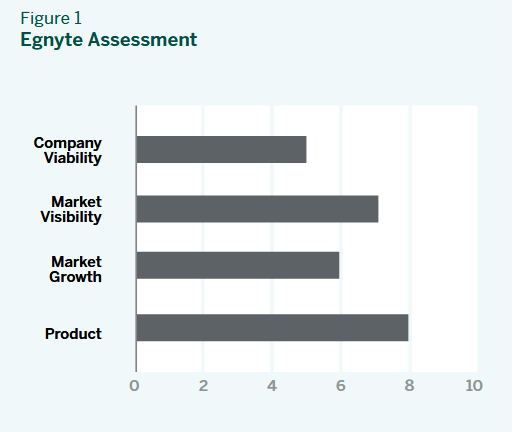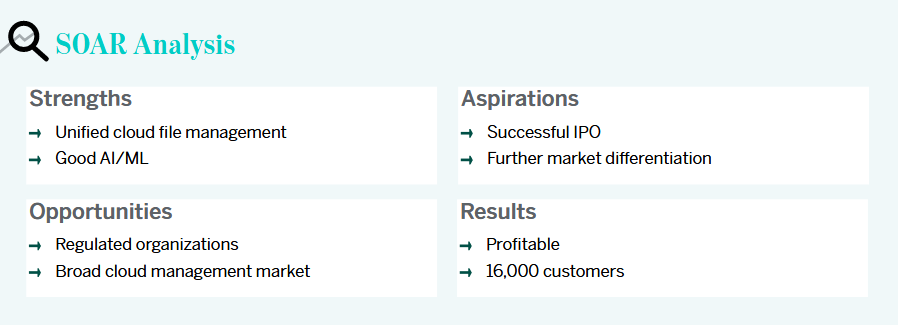Egnyte - Vignette by Deep Analysis
Founded 2007 | HQ Mountain View, CA | 400 employees (approx.) | >$100M revenue (est.)In our analysis, what makes Egnyte stand out is its ability to provide a unified platform to govern data and files across both cloud and on-premises repositories, and to automate the analysis and governance of that information in one central place.

Egnyte was founded in 2007 and is headquartered in Mountain View, California. To date, the firm has raised $137.5 million, its last round of funding being a Series E led by Goldman Sachs. We expect a major event in the next couple of years for Egnyte, ideally in the form of an IPO: the company is profitable, with annual revenues upward of $100 million, and it is still sitting on a decent chunk of the money it raised. In June 2020 Egnyte hired Suzanne Colvin as its new CFO; formerly of Napster and Verifone, she has the requisite experience to lead the company to an exit.

Egnyte claims to provide a single unified platform to govern and secure content everywhere. That’s a big claim, but Egnyte goes much further than we expected in meeting that ambition. Starting at the top of the stack, Egnyte provides a single dashboard environment for administration, security, and governance. Probably most important to note is that the dashboard and controls are not limited to Egnyte’s own cloud storage capabilities. Rather, they span an exceptionally wide range of third-party cloud and on-premises systems, including traditional file servers. In a sense, then, what Egnyte offers is a unified management system for decentralized file storage.
The Egnyte system is driven largely by AI and machine learning (ML), for example to automatically detect personally identifiable information (PII) and sensitive data. What differentiates Egnyte from others that do this type of automated work is that Egnyte has invested heavily in understanding jurisdictional areas and specific regulatory requirements. Egnyte covers 40 international jurisdictions and can scope governance policies to your chosen locations. In other words, it has templated and installed the key parameters and rules for common regulatory requirements. Once Egnyte identifies suspect information, it examines how that information is shared both internally and externally, and recommends a simple path to effective remediation. Egnyte provides some exceptionally strong capabilities, going as far as to embed standard records management functionality such as disposition, legal holds, and deletion capabilities that can also be automated to run against pre-defined policies or regulatory requirements.
The Egnyte dashboard also provides administration controls for content lifecycle management. We particularly like the lifecycle analytics viewer that allows visibility across repositories to understand their health and status; for example, how old content is and whether it is being used regularly. This caught our attention because many file admins ignore this critical task. Visually heat-mapping the various repositories’ status in the dashboard, for example, made an otherwise difficult task simple and practical for storage management and planning purposes. It’s worth repeating that the repositories being viewed may potentially include a range of third-party cloud and traditional on-premises locations.
The underlying AI within Egnyte leverages common models such as natural language understanding (NLU) and named entity recognition, along with more advanced techniques like Bidirectional Encoder Representations from Transformers (BERT), which is used to train natural language processing (NLP). In non-technical terms, these models allow Egnyte to automatically identify and classify whether a file is a contract, a bill of lading, or an invoice, etc. As such, Egnyte is able to provide some deep and comprehensive automatic classification services in addition to its governance and security capabilities. The Egnyte approach to AI is flexible; it can be used generically or trained for specific customers. Of course, it is restricted to a degree by its access to customer data to analyze and train upon. That being said, Egnyte has permissioned access to a lot of data and augments its own data with public and synthetic data sets.

Finally, we note that the dashboard itself has been well designed: considering the dashboard’s breadth of functionality, Egnyte has done a good job of building a visually rich environment. Though at heart it is an IT admin tool, it is one that could well be utilized by less technically savvy administrators.

Egnyte was best known as an Enterprise File Sync and Share (EFSS) vendor that competed with Box and Dropbox. But Box and Dropbox, and of course Microsoft and Google, won that race. Today, Egnyte is pivoting into a broader and potentially much better marketplace. Though Egnyte has offered many of the capabilities described in this report for some time, they were previously sold as separate products. Unifying everything under a single dashboard, though logical, is nevertheless a big move for the company. Indeed, providing unified governance to today’s world of decentralized and disparate cloud and on-premises file storage could pay dividends for Egnyte. More importantly, though, Egnyte is a much-needed solution for enterprises struggling to bring control to file chaos.
Figure 1 shows our assessment of Egnyte across four categories.

Don’t think of Egnyte as a cloud file sharing or EFSS platform. Though it does provide cloud file sharing capabilities, in our analysis what makes Egnyte stand out is its ability to provide a unified platform to govern data and files across both cloud and on-premises repositories, and to automate the analysis and governance of that information in one central place. Though file management was always chaotic at best within organizations, the rapid move to remote and hybrid working during the pandemic has made good file management even more critical. File administration is a thankless and difficult task, so the Egnyte system is at least worth a look for organizations trying to remedy that problem – particularly as it is one of very few options available in today’s market.

About Deep Analysis
Deep Analysis is an advisory firm that helps organizations understand and address the challenges of innovative and disruptive technologies in the enterprise software marketplace. Its work is built on decades of experience in advising and consulting to global technology firms large and small, from IBM, Oracle, and HP to countless start-ups. Led by Alan Pelz-Sharpe, the firm focuses on Information Management and the business application of Cloud, Artificial Intelligence, and Blockchain. Deep Analysis recently published the book "Practical Artificial Intelligence: An Enterprise Playbook," co-authored by Alan and Kashyap Kompella, outlining strategies for organizations to avoid pitfalls and successfully deploy AI. Deep Analysis works with technology vendors to improve their understanding and provide actionable guidance on current and future market opportunities. Yet, unlike traditional analyst firms, Deep Analysis takes a buyercentric approach to its research and understands real-world buyer and market needs versus the “echo chamber” of the technology industry.

Alan Pelz-Sharpe
Alan Pelz-Sharpe is the founder of Deep Analysis. He has over 25 years of experience in the IT industry, working with a wide variety of end-user organizations like FedEx, The Mayo Clinic, and Allstate, and vendors ranging from Oracle and IBM to startups around the world. Alan was formerly a Partner at The Real Story Group, Consulting Director at Indian Services firm Wipro, Research Director at 451, and VP for North America at industry analyst firm Ovum. He is regularly quoted in the press, including the Wall Street Journal and The Guardian, and has appeared on the BBC, CNBC, and ABC as an expert guest.